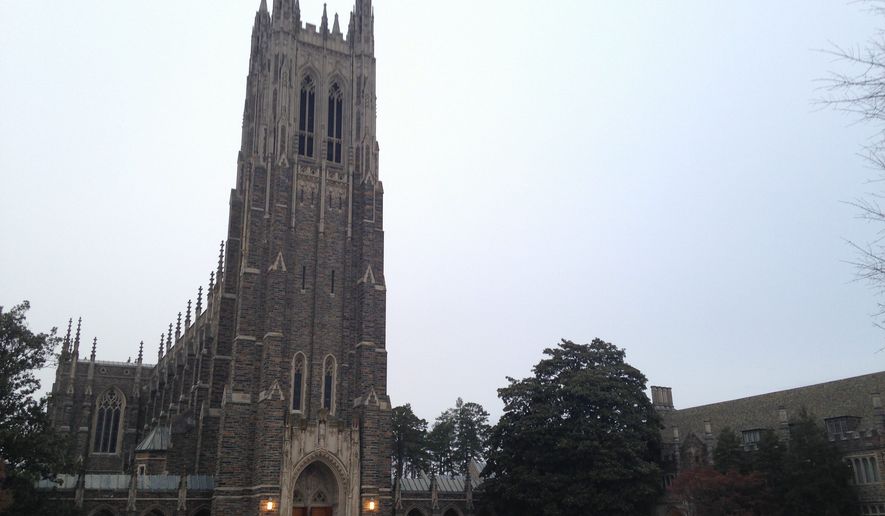A professor is resigning from the Duke Divinity School after colleagues and administrators tried to punish him for publicly criticizing a “training” program espousing a liberal view of racism.
Paul Griffiths, Warren professor of Catholic theology, is just the latest academic to find himself out of a job for refusing to toe the progressive line.
Peter Wood, president of the National Association of Scholars, said viewpoint intolerance is becoming more common in higher education as “politically correct administrations pull out all of the stops to silence the last few remaining non-progressives on their faculty.”
“Most of the silencing that occurs on college campuses occurs invisibly,” Mr. Wood said. “There is no public trace of it because people self-censor. Or if they come under pressure, they concede the point and shut up. A case like Griffiths’ stands out because Griffiths decided to go public.”
“Public” is an understatement.
The theologian created a firestorm on the Durham, North Carolina, campus this year when he responded to a facultywide email, sent by associate professor Anathea Portier-Young, that encouraged attendance at a two-day anti-racism program.
“I exhort you not to attend this training,” Mr. Griffiths wrote in the Feb. 6 email. “Don’t lay waste your time by doing so. It’ll be, I predict with confidence, intellectually flaccid: there’ll be bromides, cliches, and amen-corner rah-rahs in plenty. When (if) it gets beyond that, its illiberal roots and totalitarian tendencies will show.”
Several colleagues replied that they were looking forward to the Racial Equity Institute training session, which was scheduled for March 4-5 from 8:30 a.m. to 5 p.m.
Elaine Heath, dean of the divinity school, took a different tack.
She condemned Mr. Griffiths for using mass email “in order to humiliate or undermine individual colleagues or groups of colleagues with whom we disagree.”
“The use of mass emails to express racism, sexism, and other forms of bigotry is offensive and unacceptable, especially in a Christian institution,” she wrote in the email, also sent Feb. 6.
Mr. Griffiths sent another facultywide email months later detailing the disciplinary procedures brought against him after the initial email exchange, which was first reported by Rod Dreher of the American Conservative.
Ms. Heath tried to schedule a meeting with Mr. Griffiths but refused to let him bring a sympathetic colleague, English professor Thomas Pfau, to serve as a witness. She eventually barred him from faculty meetings and threatened to take away his access to research funds.
“It is unacceptable for you to refuse to meet with me as the Dean of the Divinity School,” Ms. Heath wrote in a March 10 memo to Mr. Griffiths. “I cannot physically force you to meet with me, but your refusal to meet with me will have consequences.”
Ms. Portier-Young filed a complaint with the Office for Institutional Equity claiming the use of “racist and/or sexist speech in such a way as to constitute a hostile workplace,” Mr. Griffiths’ email said.
Neither of Mr. Griffiths complainants responded to a request for comment before press time.
Rather than go through with the disciplinary procedures, the theologian will resign after the 2017-18 academic year.
Mr. Griffiths joins a growing list of academics who have been forced out of the university for holding beliefs that run contrary to the prevailing campus orthodoxy.
Political science professor John McAdams was suspended from Marquette University in 2014 for writing a blog criticizing another instructor, Cheryl Abbate, who told a student not to oppose same-sex marriage because it would be “homophobic.”
Mr. McAdams sued the Catholic school, but a circuit court judge ruled Thursday in favor of the university despite two affirmations of academic freedom in the faculty handbook.
His attorneys plan to appeal the decision.
Valerie Cooper, Duke Divinity School associate professor of religion and society and black church studies, said the university’s treatment of Mr. Griffiths did not violate its commitment to academic freedom because the progressive view of diversity is not a subject up for debate.
“As you read Prof. Paul Griffiths’ complaint, below, please bear in mind that Duke University has a clear statement in favor of diversity, equity, and inclusion,” Ms. Cooper wrote on Facebook this month. “Because this statement *is* Duke University policy, being against diversity isn’t an issue of academic freedom. It is academic malpractice. If you can’t abide by Duke’s policies, you shouldn’t work for Duke.”
Mr. Wood said the Marquette and Duke incidents show the university’s willingness to bend the meaning of academic freedom to the tenets of progressivism.
“No matter how hard and fast academic freedom may be specified and a university avows of its relationship to faculty members,” he said, “if a faculty member expresses an unpopular opinion, or an opinion disliked by the administration, some evasion of the rule will be invented for that purpose.
“The only thing you can count on is that all of the exceptions will be exceptions favored by the academic left.”
• Bradford Richardson can be reached at brichardson@washingtontimes.com.




Please read our comment policy before commenting.